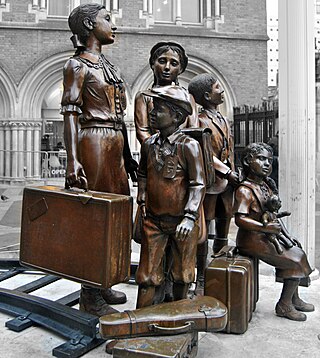Related Research Articles
Acculturation is a process of social, psychological, and cultural change that stems from the balancing of two cultures while adapting to the prevailing culture of the society. Acculturation is a process in which an individual adopts, acquires and adjusts to a new cultural environment as a result of being placed into a new culture, or when another culture is brought to someone. Individuals of a differing culture try to incorporate themselves into the new more prevalent culture by participating in aspects of the more prevalent culture, such as their traditions, but still hold onto their original cultural values and traditions. The effects of acculturation can be seen at multiple levels in both the devotee of the prevailing culture and those who are assimilating into the culture.
William Julius Wilson is an American sociologist, a professor at Harvard University, and an author of works on urban sociology, race, and class issues. Laureate of the National Medal of Science, he served as the 80th President of the American Sociological Association, was a member of numerous national boards and commissions. He identified the importance of neighborhood effects and demonstrated how limited employment opportunities and weakened institutional resources exacerbated poverty within American inner-city neighborhoods.

In sociology, an ethnic enclave is a geographic area with high ethnic concentration, characteristic cultural identity, and economic activity. The term is usually used to refer to either a residential area or a workspace with a high concentration of ethnic firms. Their success and growth depends on self-sufficiency, and is coupled with economic prosperity.

Social stratification refers to a society's categorization of its people into groups based on socioeconomic factors like wealth, income, race, education, ethnicity, gender, occupation, social status, or derived power. As such, stratification is the relative social position of persons within a social group, category, geographic region, or social unit.

Intersectionality is an analytical framework for understanding how a person's various social and political identities combine to create different modes of discrimination and privilege. Intersectionality identifies multiple factors of advantage and disadvantage. Examples of these factors include gender, caste, sex, race, ethnicity, class, sexuality, religion, disability, weight, and physical appearance. These intersecting and overlapping social identities may be both empowering and oppressing. However, little good-quality quantitative research has been done to support or undermine the theory of intersectionality.

In sociology, the social disorganization theory is a theory developed by the Chicago School, related to ecological theories. The theory directly links crime rates to neighbourhood ecological characteristics; a core principle of social disorganization theory that states location matters. In other words, a person's residential location is a substantial factor shaping the likelihood that that person will become involved in illegal activities. The theory suggests that, among determinants of a person's later illegal activity, residential location is as significant as or more significant than the person's individual characteristics. For example, the theory suggests that youths from disadvantaged neighborhoods participate in a subculture which approves of delinquency, and that these youths thus acquire criminality in this social and cultural setting.
In sociology, racialization or ethnicization is a political process of ascribing ethnic or racial identities to a relationship, social practice, or group that did not identify itself as such for the purpose of domination and social exclusion. Racialization or ethnicization often arises out of the interaction of a group with a group that it dominates or wants to dominate, and the group that wants to dominate ascribes a racial identity to the other group for the purpose of reproducing or continuing their ways of domination, and for reinforcing their social exclusion practices. It is a dehumanization process that evolved from racism, distinguishing the dominant group's identity as comparatively different and superior to the non-dominant group for the purpose of oppression. Over time, the racialized and ethnicized group develop the society enforced construct that races are real, different and unequal in ways that matter to economic, political and social life, an unhealthy norm that strips them of their dignity of full humanity. This systemic tool used for oppression and to induce trauma have been commonly used in varying flexibility throughout the history of imperialism, nationalism, racial and ethnic hierarchies.

The sociology of immigration involves the sociological analysis of immigration, particularly with respect to race and ethnicity, social structure, and political policy. Important concepts include assimilation, enculturation, marginalization, multiculturalism, postcolonialism, transnationalism and social cohesion.
Howard Winant is an American sociologist and race theorist. Winant is Distinguished Professor of Sociology at the University of California, Santa Barbara. Winant is best known for developing the theory of racial formation along with Michael Omi. Winant's research and teachings revolve around race and racism, comparative historical sociology, political sociology, social theory, and human rights.
Oppositional culture, also known as the "blocked opportunities framework" or the "caste theory of education", is a term most commonly used in studying the sociology of education to explain racial disparities in educational achievement, particularly between white and black Americans. However, the term refers to any subculture's rejection of conformity to prevailing norms and values, not just nonconformity within the educational system. Thus many criminal gangs and religious cults could also be considered oppositional cultures.

UNESCO has published several statements about issues of race.

Michèle Lamont is a sociologist and is the Robert I. Goldman Professor of European Studies and a professor of Sociology and African American Studies at Harvard University. She is a contributor to the study of culture, inequality, racism and anti-racism, the sociology of morality, evaluation and higher education, and the study of cultural and social change. She is the recipient of international prizes, such as the Gutenberg Award and the prestigious Erasmus award, for her "devoted contribution to social science research into the relationship between knowledge, power, and diversity." She has received honorary degrees from five countries. and been elected to several national honorary scientific societies. She served as president of the American Sociological Association from 2016 to 2017.
The interactive acculturation model (IAM) seeks to integrate within a common theoretical framework the following components of immigrants and host community relations in multicultural settings:
- acculturation orientations adopted by immigrant groups in the host community;
- acculturation orientations adopted by the host community towards special groups of immigrants;
- interpersonal and intergroup relational outcomes that are the product of combinations of immigrant and host community acculturation orientations.
Social privilege is a theory of special advantage or entitlement, which benefits one person, often to the detriment of others. Privileged groups can be advantaged based on social class, wealth, education, caste, age, height, skin color, physical fitness, nationality, geographic location, cultural differences, ethnic or racial category, gender, gender identity, neurodiversity, sexual orientation, physical disability, religion, and other differentiating factors. It is generally considered to be a theoretical concept used in a variety of subjects and often linked to social inequality. Privilege is also linked to social and cultural forms of power. It began as an academic concept, but has since been invoked more widely, outside of academia.

The sociology of race and ethnic relations is the study of social, political, and economic relations between races and ethnicities at all levels of society. This area encompasses the study of systemic racism, like residential segregation and other complex social processes between different racial and ethnic groups.
Second-generation immigrants in the United States are individuals born and raised in the United States who have at least one foreign-born parent. Although the term is an oxymoron which is often used ambiguously, this definition is cited by major research centers including the United States Census Bureau and the Pew Research Center.
The Distinguished Scholarly Book Award is presented annually by the American Sociological Association (ASA) in recognition of an ASA member's outstanding book published within two years prior to the award year.

Cultural racism, sometimes called neo-racism, new racism, postmodern racism, or differentialist racism, is a concept that has been applied to prejudices and discrimination based on cultural differences between ethnic or racial groups. This includes the idea that some cultures are superior to others or in more extreme cases that various cultures are fundamentally incompatible and should not co-exist in the same society or state. In this it differs from biological or scientific racism, which refers to prejudices and discrimination rooted in perceived biological differences between ethnic or racial groups. The term has been criticised as being based in moral relativism and enabling systemic or culturally normalised bigotry among minority groups.
Multiple jeopardy is the theory that the various factors of one's identity that lead to discrimination or oppression, such as gender, class, or race, have a multiplicative effect on the discrimination that person experiences. The term was coined by Dr. Deborah K. King in 1988 to account for the limitations of the double or triple jeopardy models of discrimination, which assert that every unique prejudice has an individual effect on one's status, and that the discrimination one experiences is the additive result of all of these prejudices. Under the model of multiple jeopardy, it is instead believed that these prejudices are interdependent and have a multiplicative relationship; for this reason, the "multiple" in its name refers not only to the various forms of prejudices that factor into one's discrimination but also to the relationship between these prejudices. King used the term in relation to multiple consciousness, or the ability of a victim of multiple forms of discrimination to perceive how those forms work together, to support the validity of the black feminist and other intersectional causes.

Mary Romero is an American sociologist. She is Professor of Justice Studies and Social Inquiry at Arizona State University, with affiliations in African and African American Studies, Women and Gender Studies, and Asian Pacific American Studies. Before her arrival at ASU in 1995, she taught at University of Oregon, San Francisco State University, and University of Wisconsin-Parkside. Professor Romero holds a bachelor's degree in sociology with a minor in Spanish from Regis College in Denver, Colorado. She holds a PhD in sociology from the University of Colorado. In 2019, she served as the 110th President of the American Sociological Association.